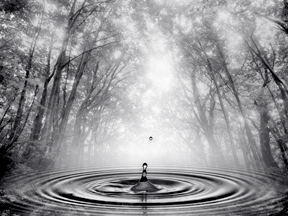|
Tomorrow is World Water Day:
Clean water for a healthy world
by Indunil THENUWARA
Water is essential for all living beings. Without this precious
liquid, no human, animal or plant will survive on Earth. It's the
essence of all life.
 Just as water is a necessity to sustain life on Earth, it's vital for
human health and well-being that water is clean. The importance of the
quality of water would be highlighted at celebrations held in connection
with World Water Day tomorrow. Just as water is a necessity to sustain life on Earth, it's vital for
human health and well-being that water is clean. The importance of the
quality of water would be highlighted at celebrations held in connection
with World Water Day tomorrow.
The theme for this year is 'Clean Water for a Healthy World' and
would focus on elements such as pollution, climate change, eco-systems
and human well-being. The theme would reflect the importance of quality
as well as quantity in water management.
The United Nations Environment Programme (UNEP) will coordinate the
events for World Water Day 2010 in collaboration with the Food and
Agriculture Organization, United Nations Development Program, UN
Economic Commission for Europe, UNICEF, UNESCO, UN-Habitat, World Health
Organization and UN-Water Decade Programme on Advocacy and
Communication. Other partner organisations such as International Water
Association, World Wide Fund for Nature and World Water Council would be
associated with the event.
All countries including Sri Lanka would organise activities to
highlight and create awareness about the importance of preserving this
natural resource. The official event will take place in Nairobi, Kenya
and will be hosted by the UNEP, UN-Habitat, UN Secretary General's
Advisory Board on Water and Sanitation and the Government of Kenya.
The activities organised in connection with World Water Day 2010
would be aimed at raising awareness about sustaining healthy eco-systems
and human well-being by addressing the increasing quality challenges in
water management; and raising the profile of water quality by
encouraging governments, organisations, communities and individuals
around the world to actively engage in addressing water quality through
prevention of pollution, clean-up and restoration of water sources.
Access to clean water and sanitation
Despite the access to clean and safe water and sanitation facilities
being among basic human rights, there are almost 1.1 billion people (20
percent of the global population), mostly in Africa, who don't have
adequate access to clean and safe drinking water and 2.5 billion (40
percent of the population) including over one billion children without
appropriate sanitation. Each year, more than 2.2 million people,
including 1.5 million children under the age of five, die from problems
associated with lack of water and sanitation.
More than 6,000 children die every day from diseases associated with
lack of access to safe drinking water, inadequate sanitation and poor
hygiene. It's said that a child dies as a result of poor sanitation
every 20 seconds.
In developing countries, about 80 percent of illnesses are linked to
poor water and sanitation conditions. The lack of safe and clean water
and sanitation services in this part of the world is mostly felt by
rural dwellers and the urban poor. Without access to these services,
they are more vulnerable to illnesses that in turn hinder their
productivity, education and other spheres in life, making escaping
poverty even more difficult.
Providing clean water and sanitation is one of the most
cost-effective ways of improving the health of people in developing
countries.
Waste disposal
One of the main goals of World Water Day is to raise awareness and
accelerate progress towards the Millennium Development Goal of reducing
half the number of people without access to clean water and sanitation
by 2015.
Over two million tonnes of human waste are disposed in water sources
around the world daily.
Due to the increased use of chemical fertiliser, an increase is
expected in the nitrogen content in river water and coastal eco-systems.
Over 1,500 cubic kilometres of waste water is produced globally each
year. Although this could be used for purposes such as energy and
irrigation, it's not. Eighty percent of waste water in developing
countries is discharged without being treated due to lack of regulations
and resources, affecting drinking and agricultural water and in turn,
human and environmental health.
This may affect water sources for generations to come. It goes
without saying that the quality of drinking water sources will be
protected if better ways are found to dispose of human waste. These are
some of the aspects that would be highlighted at tomorrow's events. The
resolution to declare March 22 as World Day for Water was adopted by the
UN General Assembly on December 22, 1992 as an initiative that grew out
of the UN Conference on Environment and Development held in Rio de
Janeiro, Brazil. The day was first observed in 1993.
Events in Sri Lanka
Sri Lanka's main event in connection with World Water Day 2010 would
be organised by the Ministry of Irrigation and Water Management and the
Irrigation Department at the Irrigation Department Auditorium in Colombo
7 tomorrow. The event on the theme 'Clean Water for a Healthy World'
would take place from 9.00 am to 1.15 pm.
The opening session would be addressed by Minister of Irrigation and
Water Management Jeevan Kumaratunga, Minister of Irrigation Jayathissa
Ranaweera, Director (Epidemiologist) Ministry of Health, Dr Paba
Palihawadana, Director of Irrigation (Regional Development and
Construction), Dr G.G.A. Godaliyadda, Director General of Irrigation,
H.P.S. Somasiri and Secretary, Ministry of Irrigation and Water
Management, K.W. Ivan De Silva.
This would be followed by technical sessions and a general
discussion. Cultural events would be a part of the program. |

